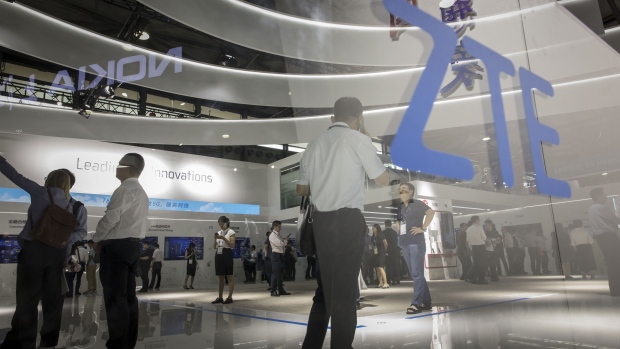Feb 3, 2020
ZTE Fights to Stay Off Blacklist as U.S. Firms Fear Cost of Ban
, Bloomberg News

(Bloomberg) -- Chinese telecommunications gearmaker ZTE Corp. has asked the Federal Communications Commission to keep it off a list of companies that can’t sell equipment to subsidized U.S. carriers because they are deemed a threat to national security
At the same time, mobile broadband providers have told the agency that it would be costly for them to replace gear made by ZTE and Huawei Technologies Co., another Chinese technology giant, if ordered to do so.
The agency in November made an initial determination that ZTE and fellow gear-maker Huawei, both based in Shenzhen, China, pose a national security risk.
The U.S. has long contended that Huawei’s equipment could be used by China to spy on the West. The company has repeatedly denied that it poses any security risk, and insists that it’s independent of the Beijing government.
The FCC is now considering whether to require wireless broadband providers to remove and replace equipment from companies considered a security risk, and how to establish a reimbursement fund for such a policy.
ZTE, in a Feb. 3 filing at the FCC, denied it was a threat and said it complies with U.S. export controls and is working to provide secure products.
The agency’s action is part of the continued pressure by U.S. officials, diplomats and lawmakers who have said Huawei and ZTE pose a threat of espionage, especially as networks are transformed into fast 5G systems that can share masses of information quickly.
Huawei gear is cheaper than competitors’ and is popular with smaller, rural U.S. telecommunications providers, which often rely on government subsidies. In a Jan. 31 filing at the FCC, Union Wireless predicted “extraordinary costs” to replace equipment in Wyoming, Utah, Idaho, Colorado, and Montana across 80,000 square miles -- an area larger than England.
The campaign stumbled last week when Britain and the European Union decided that Huawei could play a role in their 5G networks. ZTE was brought to the brink of disaster in 2018 with a ban on buying needed U.S. parts after the Trump administration accused it of violating sanctions on Iran and North Korea -- a step President Donald Trump reversed shortly after, at the request of Chinese President Xi Jinping.
ZTE paid a fine of $1.4 billion.
Union, based in Mountain View, Wyoming, said “failure to adopt a sufficient reimbursement mechanism providing an appropriate path to replace its network in an orderly fashion would be an existential threat to its business.”
The FCC in November estimated it would cost the average wireless company $40 million to $45 million to replace its Huawei and ZTE equipment. The agency in November barred the use of federal subsidies for equipment from such companies.
Congress is considering legislation to provide funds, with one bill offering $1 billion.
To contact the reporter on this story: Todd Shields in Washington at tshields3@bloomberg.net
To contact the editors responsible for this story: Jon Morgan at jmorgan97@bloomberg.net, John Harney
©2020 Bloomberg L.P.





